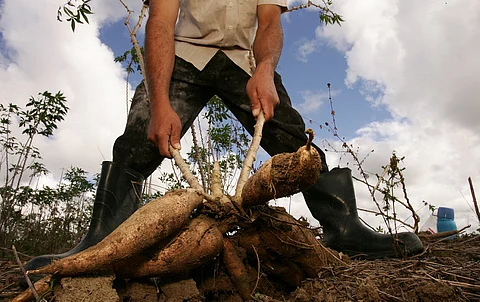

Thousands of years of indigenous farming myths and cultural traditions have been key to the survival of the cassava crop (the source of tapioca), a new study has found.
Cassava (also known as ‘Yuca’ or ‘Manioc’) is a root vegetable that feeds around a billion people worldwide. For this reason, it is often known as ‘bread of the tropics’
The crop is grown worldwide via stem cuttings, a method that produces new cassava plants that are genetic clones of the original. But clonal planting means the plant might have low genetic diversity, which may make it vulnerable to diseases.
However, when researchers from the University of Warwick, the Smithsonian Institution and Embrapa (Brazilian agricultural research) analysed the genomes of more than 500 modern, herbarium and archaeological cassava plants, they found the species to be extraordinarily diverse for a clonal crop.
They interviewed indigenous Brazilian farmers to get to know the reason behind the diversity of the crop. The interviews led them to deduce that local cultural practices and traditions have been responsible for creating and maintaining the varied cassava gene pool.
For instance, indigenous farmers told them about their belief in Kukurro, the caterpillar god with whom they decorate their farming implements.
“In Kukurro’s honour, farmers occasionally plant stems of high-yielding and resilient cassava plants in close proximity in special ‘Kukurro houses’. This enables seed-based sexual reproduction, resulting in ‘cassava from the sky’, rescuing genetic diversity to the system,” a statement by the University of Warwick noted.
The researchers found similar patterns of diversity in cassava across the different areas of the Amazon and the Caribbean. This, they felt, was unusual as regional genetic variation is common in widespread crops.
Again, further research led them to conclude that there had been exchange and trade in cuttings of different cassava varieties, resulting in regional distribution of resilient and diverse crops. For instance, as part of the marriage custom for the Brazilian Waurá people, new brides bring cassava cuttings to their husband’s village.
“This study really shows the importance of small-scale indigenous farming to our global food security,” senior author of the paper, Professor Robin Allaby of The University of Warwick, said